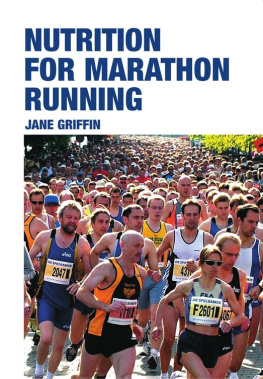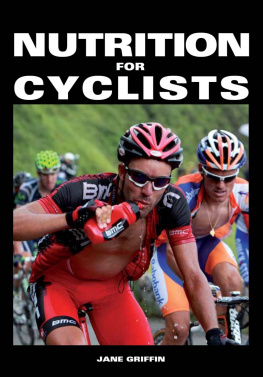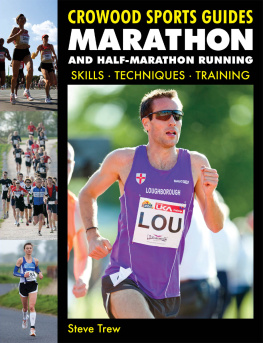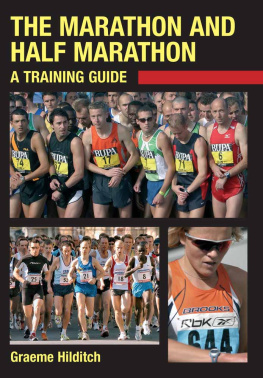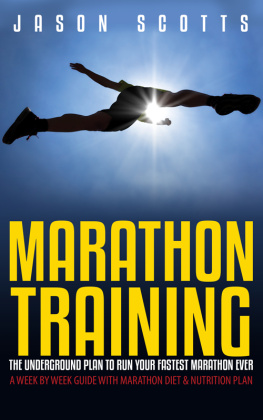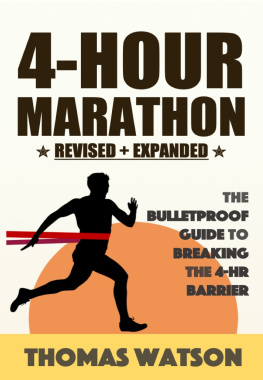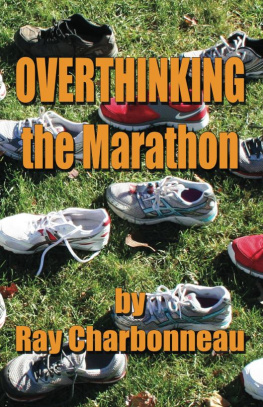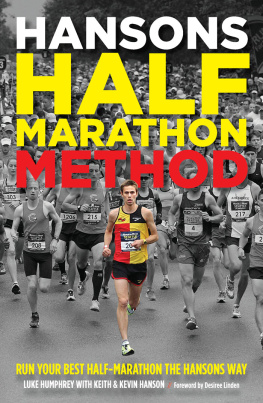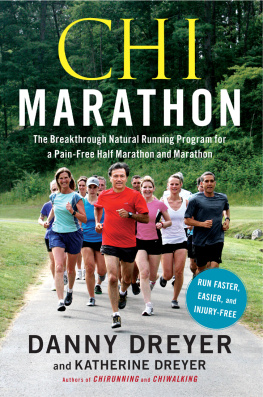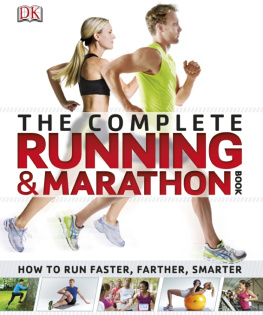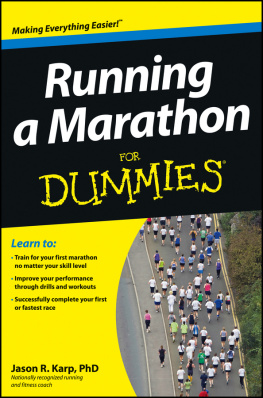First published in 2005 by The Crowood Press Ltd, Ramsbury, Marlborough, Wiltshire, SN8 2HR
www.crowood.com
This e-book edition first published in 2012
Jane Griffin 2005
All rights reserved. This e-book is copyright material and must not be copied, reproduced, transferred, distributed, leased, licensed or publicly performed or used in any way except as specifically permitted in writing by the publishers, as allowed under the terms and conditions under which it was purchased or as strictly permitted by applicable copyright law. Any unauthorised distribution or use of this text may be a direct infringement of the authors and publishers rights, and those responsible may be liable in law accordingly.
ISBN 978 1 84797 405 1
Acknowledgements
To my husband Chris for his love as well as his patience and support again!
To my children Daniel and Jessica for their love, interest and encouragement.
To my brother Robin for sound advice.
To the thousands of marathon runners I have met whose questions about diet inspired me to write this book.
An empty sack wont stand up
Old African saying
Contents
You may have picked up this book because you are thinking about running a marathon, have already started training for your first marathon or have run one that went very wrong. Your motive for running 26.2 miles may be to lose weight, generally get fitter and healthier, or raise money for charity. Perhaps you were inspired watching Tracey Morris run and win her first marathon at the 2004 Flora London Marathon and then go on and finish twenty-ninth out of eighty-one starters in the Womens Marathon in the Athens Olympics. Whatever your reasons, I hope this book helps you to achieve your personal running goal.
Evidence continues to mount on the benefits of physical activity for the well-being of body and mind. The protective effects are as strong as not smoking and include reduced risk of heart disease, cancer, diabetes, osteoporosis and, of course, overweight and obesity. Regular running may help you cope better with the daily stresses of life and promote healthy sleep patterns . The running body is like a high-performance car. You would not use low-grade petrol and oil in such a car. You would not neglect to top up the battery or keep the tyres at the right pressure or the bodywork clean and sparkling. Similarly, the running body needs the right foods and fluids to provide energy and all the essential nutrients to keep the muscles and nerves functioning efficiently, the joints supple and flexible, and the body well-hydrated.
This book has a brief introduction to nutrition and then explains how the running body works. The next two chapters give practical advice about what, when and how much to eat and drink to maximize performance. helps you to prepare for the marathon itself, including giving the low-down on carbohydrate loading, how to manage water stations efficiently, and what to do in the days after the marathon. After a short chapter on ergogenic supplements (things that may or may not help you to perform better), the next chapter covers specific issues you need to consider if you are a vegetarian, female, veteran, diabetic or a wheelchair marathoner, or if you are planning to run a marathon in a cold or hot climate. Finally, Running into problems gives advice on dealing with certain difficulties that you hope will not happen.
When I ran the London Marathon, in 1986, at about 20 miles I encountered one of these difficulties. A huge amount of my training had been done in the evening and none before mid-day . My body was stunned by the early start and, although my legs knew what to do, my gastrointestinal system was totally confused. Accessible loos were few and far between. On a positive note, I have the marathon to thank for my husbands interest in cooking. As my Sunday training runs got longer and longer, my children were in pyjamas before Sunday lunch was ready. So Chris took over and to this day still cooks our Sunday lunch. Happy running and happy eating.
Jane Griffin, Sports Dietitian and Nutrition Consultant
Food provides the body with the energy and nutrients it needs for growth and development, to meet daily lifestyle requirements and maintain health. Food choices making up a runners daily diet must meet all these requirements, otherwise running performance will suffer, risk of infection and injury will increase, and there may even be long-term health implications. Not only do nutrients perform different functions in the body but the type and amount of nutrients varies from food to food. Understanding what energy and nutrients do in the body and which foods are good sources of particular nutrients will help a runner to build up the best possible diet. That diet should maximize performance, both in training and races, and keep the body fit and healthy. It must also be practical and fit into the lifestyle and daily schedule of the runner and of course it must be enjoyable!
NUTRIENTS AND THEIR MAIN FUNCTIONS
Food is made up of carbohydrate, fat, protein , vitamins, minerals and water. In some foods, particularly fruits and vegetables, a very large proportion is water; in others, such as oils and fats, the water content is minimal. The amounts and indeed the presence of the different vitamins and minerals can vary considerably between foods, too. This is one of the reasons why health professionals are constantly encouraging the general public to eat a diet containing a wide variety of different foods.
Carbohydrate and fat are the major sources of energy or fuel for the body. Protein has the unique function of providing the material for the growth and repair of the body and is also an important component of enzymes, hormones and antibodies. When the diet contains more protein than is needed it contributes to the overall energy pool of the body. If insufficient carbohydrates and fats are available to meet energy demands, protein can be used to meet the shortfall.
Vitamins and minerals are essential components of the diet. Although the majority of them are needed in very small amounts they do play vital and often very different roles in the diet. Vitamins are a diverse group of substances that are needed for the regulation of chemical processes in the body. Although not a source of energy in themselves, many of them are involved in the release of energy from food. They cannot be made in the body in sufficient amounts to meet requirements and so must be provided by the diet. Minerals are also essential nutrients, which must be supplied by the diet. Like vitamins, they fulfil many functions. They help to control the composition of body fluids, and are constituents of bones and teeth and essential components of enzymes and proteins such as haemoglobin.
ENERGY
Terms Used
It is a myth that energy is good because it helps to fuel activities such as running and calories are bad because they are fattening. In that case, an energy bar will help a runner but a chocolate bar will make him or her fat! Energy can be measured in calories or joules. For the scientifically minded, one calorie is the amount of heat needed to raise the temperature of 1g of water by 1C. The calorie is a very small unit, so the Calorie, which is 1,000 times greater than the calorie, has always been used for nutritional measurements . The kilocalorie is the same as the Calorie. This avoids any confusion between calorie and Calorie (initial capital C) and the possibility of printing errors on food packaging. Kilocalories have been replaced by the general unit for measuring energy, the kilojoule. Although it is more scientifically correct to use kilojoules, kilocalories still remains popular with the general public and both units are used in food labelling.

